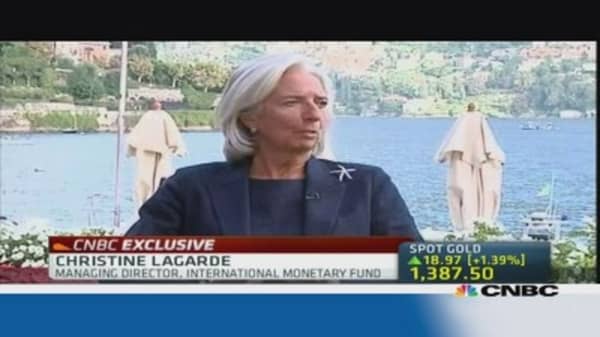The Federal Reserve cannot afford to ignore the risk of fallout in emerging markets from the winding down of its $85 billion-a-month bond buying program, said Christine Lagarde, managing director of the International Monetary Fund.
"Very negative spill-over effects on the emerging market economies could very much backfire on other economies. So to assume that [the] domestic economy is totally isolated, that a country is an island, would not be the right approach," Lagarde told CNBC on the sidelines of the Ambrosetti Forum in northern Italy over the weekend.
"Without necessarily changing the mandate, without reviewing the terms of references, and maybe without even acknowledging it, I cannot believe that central bankers do not take into account what's happening elsewhere in the world," she said.
(Read more: Larry Summers the next big risk for emerging markets?)
Policymakers at the Group of 20 (G20) summit held in St. Petersburg, Russia on September 5-6 were heavily engaged in discussions over the consequences of ending ultra-loose monetary policy in advanced economies, alongside a divisive debate over military action in Syria that took center stage.
To the surprise of many, Lagarde said that emerging markets did not "complain heavily" about the possibility of tapering. Instead, policymakers of developing economies acknowledged that the slowdown in their growth is the result of a combination of factors including capital outflows, a lack of structural reforms, and insufficient international trade, she said.
"On the other hand, the advanced economies acknowledged that the tapering of the unconventional monetary policies, though left to the central banks, had to be orderly, well communicated and had to be done in dialogue with other economies of the world," she added.
Another key achievement of the G20 was a commitment by policymakers to extend a moratorium on any new protectionist measures from 2014 to 2016, said Lagarde.
(Read more: Emerging markets: The comeback kid of 2014?)
"The leaders agreed to not enter into any protectionist measures for the next two years, until 2016. That was a matter for debate; not everyone agreed. Some were prepared to commit until 2015 but no further. They agreed to rally around 2016, no protectionist measures. That's a big achievement as well," she said.
Europe getting back on track
Responding to criticism that European policymakers have wasted an opportunity to carry out structural reforms, Lagarde said "the window is not closed."
"The ECB [European Central Bank] still has room to maneuver, they have space. And my hunch is that there will continue to be [loose] monetary policy on the part of the ECB with insistent and friendly pressure on policymakers to take the right measures both in terms of structural reforms and in terms of appropriate fiscal consolidation pace," she said.
Lagarde praised the progress that has been made in Europe thus far, pointing to the return to positive growth in the single currency bloc during the second quarter of 2013 after six quarters of contraction.
(Read more: Jobs data weakens tapering expectations)
"Look back at three years ago when I was finance minister for France, huge changes have taken place since the financial crisis, in terms of fiscal consolidation, in terms of collective discipline, in terms of European Stability Mechanism, in terms of path that is identified with a precise steps and a time line for a European banking union," she said.
"Yes, we will talk about hiccups on the road, we will talk about bumps and we will talk about difficulties and there will be little casualties here and there but there has been huge progress," she added.
—By CNBC's Ansuya Harjani; Follow her on Twitter @Ansuya_H




